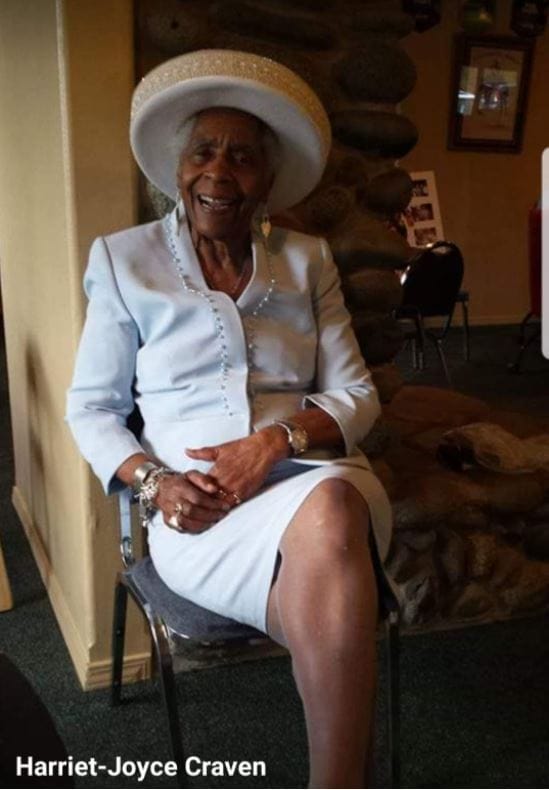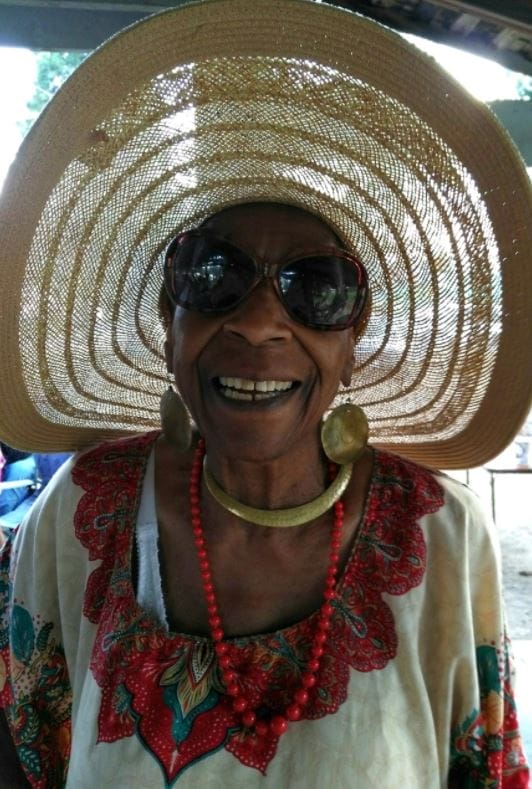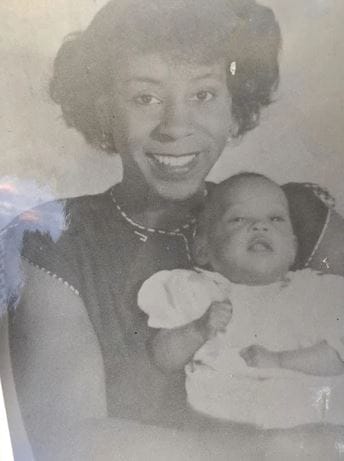Roslyn’s Black Pioneers: Remembering Harriet Joyce (Craven) Hawkins (Part 4/4)
Written by Alisa Weis, and originally published in the Northern Kittitas County Tribune.
Click to read part 1, part 2, and part 3 of this series.
Chamara Smith was mourning the loss of her grandmother, Joyce, when she was recently greeted by a blueish gray hummingbird that wanted to linger. This one didn’t come to simply drink and fly off to feeders in other yards. It stayed awhile on her porch.
“It was singing. This one was different,” Chamara said. “I felt my grandmother’s spirit. It was her personality. What the hummingbird did, like how it danced, sang and did a little wink at the end. Like my grandmother used to do.”
This hummingbird made Chamara wonder if her grandmother just might be sending her a comforting sign that she was with her in the midst of her sorrow. If so, it was in her grandmother’s nurturing nature to do so.
A woman of faith
Harriet Joyce (Craven) Hawkins – Joyce to those who knew her well – graced this earth for over 91 years, and what a full, beautiful, accomplished life she lived. Not long into a conversation about Joyce, and you hear of her tremendous faith in God.
“Joyce was a prayer warrior,” said her younger sister, Kanashibushan Craven. “Those who knew her, knew not to call her between 7 and 8 in the morning because she was praying.”
This faith, which guided her life’s path, began in her early years. It sustained her through trying and uplifting times and gave her a peace that drew others to her.
Roots in Roslyn
As many in Roslyn know, Joyce was a descendant of the first Black miners to arrive on Washington soil. In her later years, she became known as the matriarch of the Craven family, the only remaining Black family from that era to still call Roslyn their home.
For those unfamiliar with the history, back in 1888/89, more than 300 Black miners and their families migrated to Roslyn after being told they would have promising positions in the new No. 3 Mine. They weren’t told until their trains arrived in Montana that they would be used to break a contentious strike with angry European miners who wanted better pay and safer conditions. Despite this contentious reception, Black and white miners eventually worked together, putting aside difference in color to get a hard job done.
Over time, most Black families sought work opportunities across the state, but the Cravens remained.
Early days
Joyce was Samuel and Ethel Craven’s fourth daughter. The couple had nine daughters, followed by four sons. Joyce “was known as a beauty,” said her daughter, Merrilee Smith. She had a few health challenges with her appendix when she was young, which meant she wasn’t expected to do as much labor around the house.
“She stayed close to my grandma,” Merrilee said.
Although Joyce was never drawn to sports like many of her siblings, she found plenty of other activities that held her attention: dancing, singing, reading and cooking among them.
“She was a homebody by nature, but she liked people and got along with them well. She was quiet and never raised her voice. She could be a tattletale though,” said Kanashibushan Craven, with laughter in her voice.

Determination in the Face of Challenge
As they grew up in Roslyn, the Cravens grew accustomed to often being the only Black students in a class of 27 to 28. While some teachers treated them well, others tried their best to place restrictions on Joyce and her siblings, refusing to grant several of the girls their rightful place as Valedictorian.
While there were blessings to living in Roslyn – having a small, tightknit community, knowing who to turn to for help – the Craven sisters knew early on that Black women wouldn’t be hired for even waitressing or cleaning positions. They’d have to go elsewhere for employment.
The Cravens didn’t let societal limitations, spoken or unspoken, prevent them from pursuing their goals and ambitions.
Kanashibushan wasn’t surprised her sister wanted to be a teacher.
“She had to work so hard for it,” she said, thinking back on her older sister’s experience.
Joyce was one of two students at Central Washington College of Education, now known as Central Washington University. She graduated with three bachelor’s degrees.
“They didn’t hire Black teachers often unless you had light skin. It’s still like that today sometimes,” Kanashibushan said. “She had to go to Portland to work since there were no positions for her in Washington.”
While she considered herself a lifelong teacher and later completed graduate work at Seattle University, Joyce’s work wasn’t only accomplished within classroom walls. She joined forces with her oldest sister Leola Woffort, to fight for the rights of marginalized and underrepresented populations. They worked tirelessly for Motivated Mothers and defended Welfare Rights in various states.
“My sister won awards for her work in the community,” said her younger sister, Ethel Craven-Sweet. “She flew all over the country helping people with their welfare rights. She helped people in the community better their lives.”
Said Merrilee, “My mother was an activist. She saw what needed to be changed and fought for the rights of women and children.”

Joyce’s faithful activism included marching with Dr. King during the Civil Rights Era. She was also awarded a certificate from Rev. Jesse Jackson for her work with vulnerable populations.
Joyce and her eldest sister, Leola Woffort put their efforts into helping those who were redlined in the Central Area in Seattle between Madison Street (north) and Jackson Street (south). They ensured that more people knew which social services were available to them and where to find them.
“My mother and her older sister were phenomenal,” said Rose-Ethel Finister Harris, Joyce’s youngest daughter. “They were strong women who worked for positive change, not only for people of color, but people, period. My mother was an advocate for the community, and she worked to bring the best changes for everyone.”
Joyce also prioritized the needs of her family. The mother to three: Merrilee Smith, Ricci Greenwood, and Rose-Ethel Finister Harris, and the grandmother to many, she made sure she was available to lend a hand or an ear. Given her strong focus on education, Joyce inspired her children to follow in her footsteps and prioritize their education.
“My mother was very interactive with our studies,” said Rose-Ethel. “She spent three years as the President of the PTA when my siblings and I were growing up.”
All three of Joyce’s children attended the University of Washington.
Accolades, Memories and Joyce’s legacy
“My mother was my first teacher,” said her son, Ricci Greenwood. “Kindergarten at Lafayette Elementary School. I lived under my mother the first 18 years of my life. Her lessons were biblical and glorious.”
Whether it was caring for a loved one after a surgery, singing to the children, or remembering family and friends with birthday cards, when Joyce saw a need, she rose to the occasion. There was a quiet strength and boldness about her that lives on. So does her whimsical, sultry side that brought great joy and amusement to those who knew her.
“My grandma knew how to dress,” her granddaughter Chamara said, with a smile in her voice. “She was a flirt, too. People always wanted to help her wherever she went, both men and women. She had a presence when she walked in a room.”
Her daughter Merrilee reiterated her mother’s flair for style, saying that her mother would opt for a pencil skirt over pants on any occasion.
“My mother had a lot of “get up and go,” said Merrilee. “She was walking until she was 87 or 88 and rarely used her scooter. She barely stayed home (in her later years), but her home was a beautiful sanctuary.”
Although she made her home in Washington, Joyce loved to travel and treasured her trips to Jamaica, Germany, and Israel.

Joyce’s younger sister Ethel has fond memories of their activism on behalf of the Roslyn Black Pioneers over the past few decades. In addition to speaking at numerous schools in the Pacific Northwest and teaching students about their family heritage, the sisters spent time assembling floats for parades across the state in the 1980’s and 1990’s.
“I’ll never forget when Joyce showed off her legs on our float,” said Ethel. “We were wearing shimmering dresses, and at one point, my sisters and I all raised our legs together. The driver saw what we were doing, and he put his skinny, pale leg up too,” Ethel laughed.
“We had so much fun. I didn’t know how to make a float at first. We were facing backwards and should have been facing the people in the crowd, but that didn’t matter. We went into the Kingdome for our Roslyn Black Pioneer Centennial Anniversary in 1988 and were met with a standing ovation,” said Ethel. “In 1990 we won First Place at Renton River Days. Our message was about love, having a dream, and letting people know about the Roslyn Black Pioneers.”
Though it’s bittersweet for Joyce’s family and friends to look back on such memories, her legacy is only just beginning.
“My mother was my best friend throughout my life,” said Ricci. “I have the biggest hole in my heart, which can never be filled. I just hope as I live the remainder of my life, I can be 1/100th what my mother was.”
There’s no doubt in Rose-Ethel’s mind that if her mother was still here, she would be advocating for positive change with the events happening in our nation now concerning criminal justice reform.
“If my mother was still here, she’d inspire people to get out there, be active and affect the change we need,” said Rose-Ethel. “She wants people to be blessed.”
While Joyce’s family is grieving her loss, it’s heartening for them to know that the work she started can be upheld and furthered by future generations.
“Sometimes I think about my great grandmother and my grandmother surviving in this country, and I hear of all they went through, it gives me strength,” said Chamara.
“My grandmother taught me to be committed, loyal, and dedicated. She is someone who kept on going.”
She said she can’t help but think when she sees signs like the beautiful hummingbird outside her door that her grandmother’s presence is with her still.





